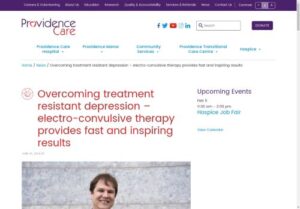Online Links to ECT News and Testimonials
Professional Accounts of ECT
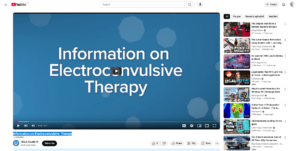
Information on Electroconvulsive Therapy
Information on Electroconvulsive Therapy at the Resnick Neuropsychiatric Hospital

Sutter Health sees positive results with electroconvulsive therapy for severe depression
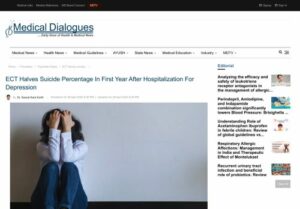
ECT halves suicide percentage in first year after hospitalization for depression
Electroconvulsive Therapy (ECT) was associated with a 50 percent reduction in risk for suicide among patients with depression in the year after their hospitalizations according to a new CAMH and ICES – led study of over 67,000 patients, published in the journal of The Lancet Psychiatry.
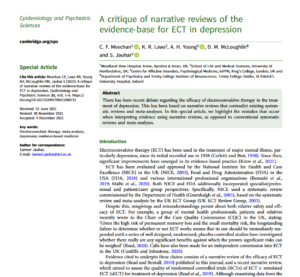
A critique of narrative reviews of the evidence-base for ECT in depression
There has been recent debate regarding the efficacy of electroconvulsive therapy in the treatment of depression. This has been based on narrative reviews that contradict existing systematic reviews and meta-analyses. In this special article, we highlight the mistakes that occur when interpreting evidence using narrative reviews, as opposed to conventional systematic reviews and meta-analyses.
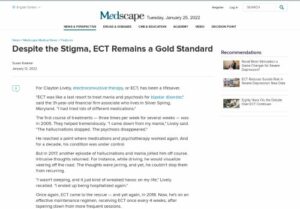
Despite the Stigma, ECT Remains a Gold Standard
Numerous medical professionals confirming that ECT is still the most effective treatment for depression.
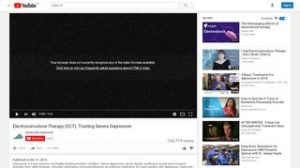
Dartmouth Hitchcock – Electroconvulsive Therapy (ECT): Treating Severe Depression
This video presentations describes the modern use of ECT. In addition, several former patients are interviewed and describe the impact the treatment has had on their lives.
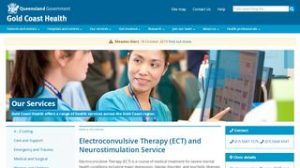
Gold Coast Health ECT Patients Video
Electroconvulsive Therapy (ECT) involves a course of medical treatments for severe mental health conditions including major depression, bipolar disorder, and psychotic illnesses such as schizophrenia. This video describes the treatment and includes patient interviews about its effects.
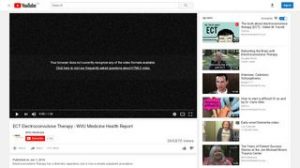
ECT Electroconvulsive Therapy - WVU Medicine Health Report
Electroconvulsive Therapy has a controversial reputation, but is now a simple inpatient or outpatient procedure. This brief video from West Virginia University illustrates how the procedure is conducted.
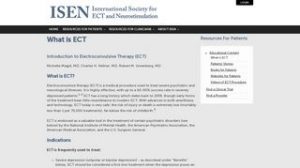
ISEN Electroconvulsive Therapy Educational Page
The International Society for ECT and Neuromodulation is a professional society focusing on the practice of ECT and related technologies. The ISEN website has a section that provides educational resources for potential patients and family members.
News Stories
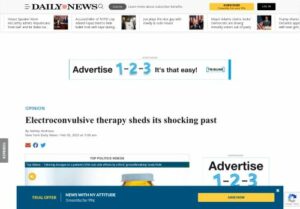
Electroconvulsive Therapy Sheds Its Shocking Past
A psychiatry medical student discusses how even though ECT is the most effective treatment for patients struggling with treatment resistant depression, it is vastly underused.
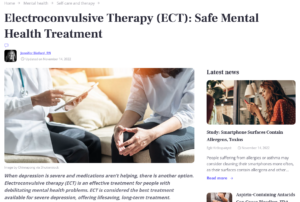
Electroconvulsive Therapy (ECT): Safe Mental Health Treatment
When depression is severe and medications aren’t helping, there is another option. ECT is an effective treatment for people with debilitating mental health problems. ECT is considered the best treatment available for severe depression, offering lifesaving, long-term treatment.
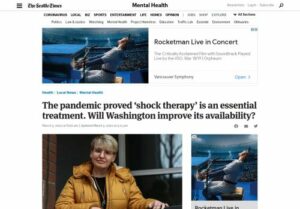
The pandemic proved ‘shock therapy’ is an essential treatment. Will Washington improve its availability?
During the pandemic, Dr. Anna Borisovskaya was treating a man who was so severely depressed that he required hospitalization.

Explaining ECT: breaking the stigma on a mental health treatment for depression, bipolar disorder
Once known as ‘electroshock therapy,’ WYFF4’s Renee Wunderlich heard from a patient and a doctor about how the modern mental health treatment now called ECT is purposely peaceful.
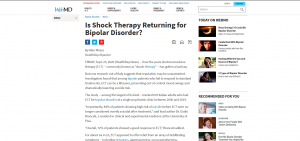
Is Shock Therapy Returning for Bipolar Disorder?
In new research Italian investigators found that among bipolar patients who fail to respond to standard treatments, ECT can be a lifesaver, preventing out-of-control mood swings and dramatically lowering suicide risk.

The University of Melbourne Article about De-Stigmatizing ECT
Dr. Alby Elias of the University of Melbourne argues that modern ECT bears little resemblance to how the procedure was performed in earlier decades. Including family members in the consent process and having them present during the procedure may help to reduce stigma and misconceptions.
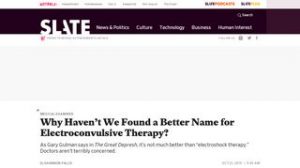
Why Haven’t We Found a Better Name for Electroconvulsive Therapy?
This article is inspired by the comedian Gary Gulman who discusses his treatment with ECT in the HBO special, The Great Depresh. Gulman points out that the change of name to “electroconvulsive therapy” is hardly more reassuring than the original term “electroshock therapy.” In this article, ECT experts discuss why the procedure is so named.
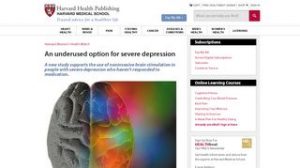
An underused option for severe depression
A new study supports the use of noninvasive brain stimulation in people with severe depression who haven’t responded to medication. In particular, both ECT and transcranial magnetic stimulation (TMS) were found to be especially effective treatments.
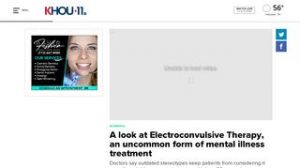
A look at Electroconvulsive Therapy, an uncommon form of mental illness treatment
The conduct of ECT is demonstrated at the Brain Stimulation Center at Houston’s Menninger Clinic. It is stated that for major depression the remission rate is as high as 90 percent, and the efficacy of ECT is far superior to that of antidepressant medications.
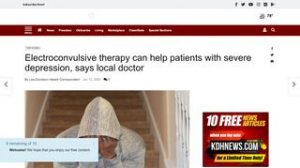
Electroconvulsive therapy can help patients with severe depression
This article is from the Killeen Daily Herald, a newspaper in Killeen, Texas. It is claimed that ECT is the most effective treatment available for severe depression unresponsive to other treatments. The conduct of ECT is briefly described as well as the fact that the stigma associated with the treatment is no longer justified.
Testimonials

Writer Donald Antrim Shares Raw Details of His Suicidal Illness to Help Others 'Trying to Stay Alive'
With a pair of successful novels already out in the world, Donald Antrim was named by The New Yorker in 1999 as one of the 20 best writers under age 40. Seven years later, it seemed that all he could write were suicide notes.
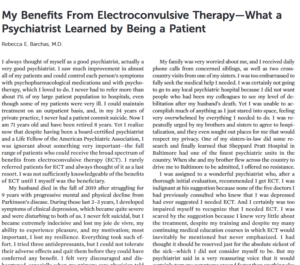
My Benefits from Electroconvulsive Therapy - What a Psychiatrist Learned from Being a Patient
Dr. Rebecca Barchas, a psychiatrist in Virginia, describes how ECT changed her life and allowed her to find healing for her depression.

ECT Helps a Young Raleigh Woman with her depression
One Triangle woman is crediting electroconvulsive therapy for helping curb her depression.

TED Talk: Surgeon Sherwin Nuland discusses how ECT saved his life
Surgeon and author Sherwin Nuland discusses the development of electroconvulsive therapy as a cure for severe, life-threatening depression — including his own.
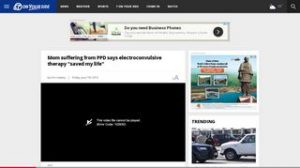
Mom suffering from PPD says electroconvulsive therapy "saved my life"
A young mother experiences severe post-partum depression after the birth of her second child. She believes that ECT saved her life.
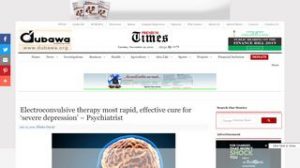
Electroconvulsive therapy most rapid, effective cure for ‘severe depression’ – Psychiatrist
According to a UK psychiatrist, Miriam Alexander, ECT is the most rapid and effective treatment for severe depression. Dr. Alexander states that if she ever develops a severe depression ECT would be her preferred treatment strategy.
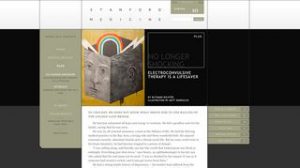
Electroconvulsive Therapy is a Lifesaver
This article describes the use of ECT in a medical professional in his late 50’s who had exhausted all hope to continue living. He was found at the railing of the Golden Gate Bridge after he left a goodbye note for his family, saying that he was sorry. After failing to benefit from multiple medications, both the patient and his psychiatrist believe that ECT saved his life.
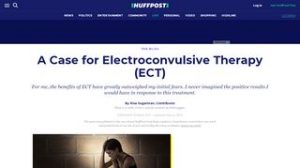
Risa Sugarman: A Case for Electroconvulsive Therapy
Risa Sugarman, a social worker, had tried medication after medication to combat her depression over a 20 year period, and medications were no longer effective. She describes her fear of ECT, and the remarkable improvement it produced.

ECT put famous comedian Gary Gulman on path toward remission:
Remission is not only feeling better. It is being indistinguishable from someone who does not have a mental illness. It is not a cure but total control of the illness. No other treatment in psychiatry has better data to return a person to their pre-illness functioning than ECT.


